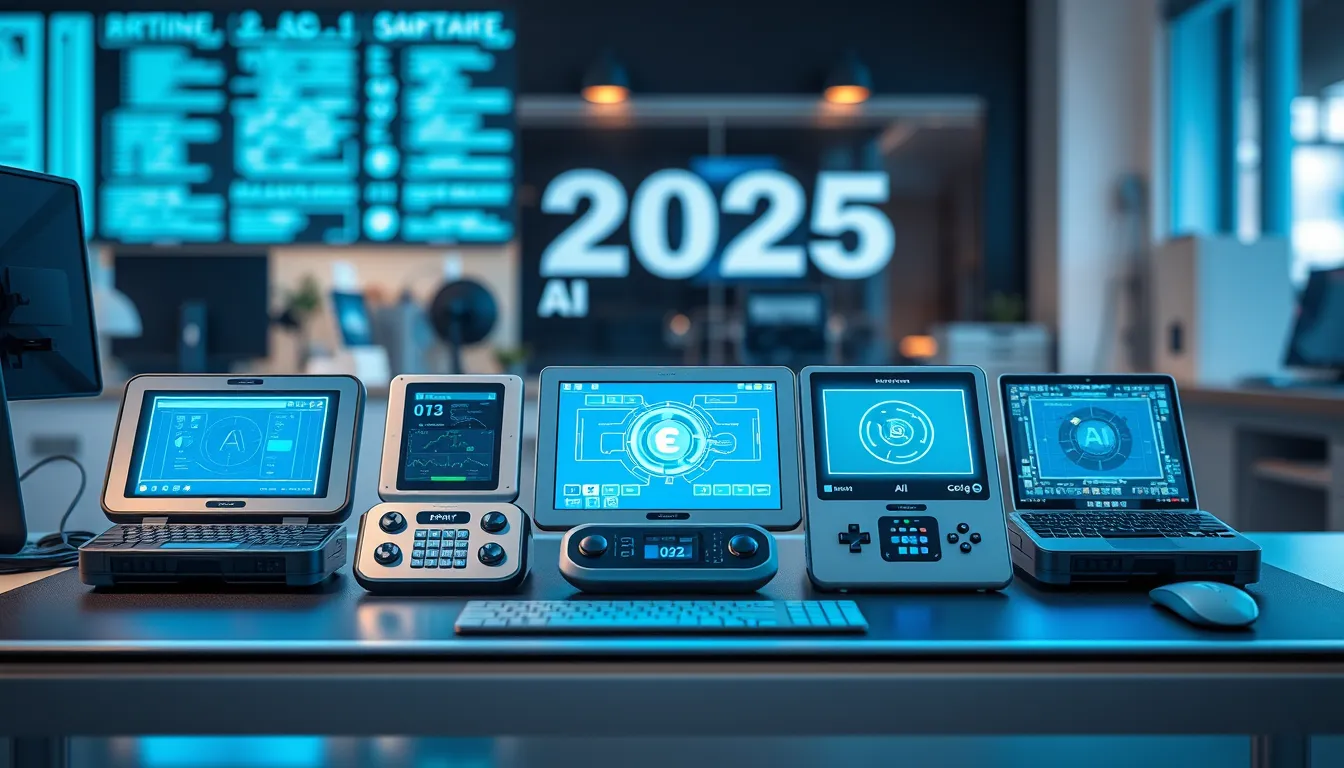Now Reading: Revolutionize Your Code with Top AI Coding Tools in 2025
-
01
Revolutionize Your Code with Top AI Coding Tools in 2025
Revolutionize Your Code with Top AI Coding Tools in 2025

Revolutionize Your Code with Top AI Coding Tools in 2025
Introduction
Artificial Intelligence (AI) is rapidly reshaping the world of software development. AI coding tools are at the forefront of this transformation, helping developers optimize, debug, and enhance code in ways that were once unimaginable. In today’s development landscape, where efficiency and precision are crucial, machine-learning based coding tools, automated debugging tools, and advanced code optimization systems have become indispensable. Whether you are a novice coder trying to learn the ropes or an experienced developer striving for peak performance, AI coding tools can significantly elevate your programming capabilities.
In this article, we explore the most impactful AI coding tools available in 2025. We will review a range of free AI coding tools along with explaining how these innovative solutions work to improve code quality and efficiency. Our discussion is designed to provide you with a comprehensive view of how integrating these tools into your workflow can lead to more robust, error-free, and maintainable code.
The Evolution of AI in Software Development
Over the past few years, the development ecosystem has witnessed a tremendous evolution. Initially, coding was a largely manual process, but it has now been augmented by automation and artificial intelligence, which have introduced a paradigm shift in how developers approach problem-solving. AI coding tools leverage machine learning algorithms to analyze code in real time, predict potential errors, and suggest optimal solutions. This shift not only accelerates the development cycle but also enhances code quality by reducing the likelihood of bugs and inefficiencies.
The integration of AI in coding has democratized access to high-quality development tools. For instance, even programmers with limited experience now have access to features that were once exclusive to expert-level coders. This democratization has led to a more inclusive and innovative environment where ideas can be rapidly prototyped and iterated upon until perfection is achieved.
Free AI Coding Tools Review 2025
In our review of free AI coding tools for 2025, we have carefully selected several standout options that offer a range of functionalities—from intelligent code suggestions and real-time debugging to comprehensive code optimization and cloud integration. Each of these tools comes with its own unique set of features designed to address various aspects of coding challenges encountered in modern software development.
Qodo: Intelligent Code Suggestions and Real-Time Debugging
Qodo stands out for its ability to offer intelligent code suggestions that adapt to your coding style. The tool provides real-time debugging support, enabling you to identify and resolve issues as you write your code. Qodo’s context-aware assistance is powered by advanced machine learning algorithms that have been trained on a wide variety of coding conventions and styles, making it a reliable partner in both routine and complex coding scenarios.
Amazon CodeWhisperer: Cloud Integration and Secure Coding
Amazon CodeWhisperer is another powerful tool that integrates seamlessly with cloud-based development environments. It not only automates testing processes but also incorporates secure coding practices into its workflow. By constantly scanning for potential security vulnerabilities and ensuring compliance with modern coding standards, Amazon CodeWhisperer helps developers maintain robust and secure code bases, which is especially critical for large-scale, cloud-dependent projects.
IntelliCode: AI-Driven Code Optimization
IntelliCode employs AI-driven insights to refine your code. It evaluates your coding patterns and suggests improvements that enhance productivity and maintain optimal performance. Whether it’s optimizing loops, refining algorithm structures, or ensuring best practices in code design, IntelliCode is engineered to streamline your coding process. Its intelligent autocompletion feature predicts and adapts to your coding habits, thereby reducing repetitive tasks and speeding up your development cycle.
Ponicode: Simplified Automated Debugging
Ponicode focuses on simplifying the debugging process by utilizing automated tools that quickly pinpoint and resolve errors. Its advanced error detection mechanism not only identifies issues but also provides detailed explanations of why an error might have occurred, helping you learn and improve your coding skills over time. This tool is particularly useful for developers who are new to coding or those looking to reduce the mental overhead associated with manual debugging.
YOGI Bot: Machine Learning for Smarter Code
YOGI Bot exemplifies the integration of machine learning techniques in refining code. It offers predictive insights based on extensive data analysis and customizes its suggestions according to the project’s requirements. YOGI Bot is designed to work in a variety of development environments, making it a versatile solution for teams looking to adopt AI-based coding methodologies. Its ability to integrate with different programming languages and frameworks makes it a universal asset for diverse coding projects.
CodeT5: Advanced API for Code Quality Improvement
CodeT5 offers an advanced API specifically designed to improve code quality. By leveraging state-of-the-art natural language processing techniques, CodeT5 can understand complex codebases and suggest context-appropriate modifications. This tool is particularly beneficial when working on large projects where consistency and readability are paramount. Its API makes it easy to integrate with existing development pipelines, ensuring a seamless enhancement process.
Kite: A Legacy Tool that Set Standards
While Kite was once a highly influential tool in the realm of AI coding assistance, it has now been discontinued. However, its legacy in setting the standards for AI coding tools still resonates. Kite’s innovative approach to predictive code suggestions and machine learning integration paved the way for many of today’s tools. Understanding Kite’s contributions helps us appreciate the rapid advancements in AI technology and its ongoing impact on software development.
How AI Coding Tools Enhance Code Quality
The adoption of AI coding tools in modern software development brings numerous advantages. Here are some of the key benefits that these tools offer:
- Improved Code Accuracy: AI tools provide predictive insights that guide developers in writing syntactically correct and efficient code. By analyzing vast amounts of code samples and identifying common pitfalls, these tools help reduce human errors substantially.
- Faster Debugging and Error Resolution: One of the most significant benefits of AI coding tools is their ability to automate the debugging process. Automated debugging minimizes the time developers spend on identifying and fixing errors, thereby accelerating the development cycle and ensuring timely project delivery.
- Enhanced Code Optimization: Leveraging machine learning algorithms, AI tools suggest optimizations that make code run more efficiently. This includes refining complex logic, optimizing loops, and managing resource usage effectively. The result is a codebase that not only meets functional requirements but also performs optimally under real-world conditions.
- Learning and Development: For newer developers, AI coding tools are an excellent learning resource. They provide instant feedback on coding practices, explain complex error messages, and offer suggestions for improvement. This continuous learning loop helps developers improve their skills over time, making them more proficient coders.
- Consistency and Collaboration: In team environments, ensuring code consistency can be challenging. AI coding tools enforce coding standards across projects, making it easier to maintain a uniform codebase that facilitates collaboration. Consistent coding practices also reduce the likelihood of misunderstandings and integration issues during team projects.
The Mechanisms Behind AI Coding Tools
To appreciate the benefits mentioned above, it is essential to understand the underlying mechanisms that power AI coding tools. At the core, these tools are built on sophisticated machine learning models, often trained on millions of lines of code. Here is a brief overview of the key technological components:
Machine Learning and Deep Learning Models
Most AI coding tools rely on supervised learning techniques where vast datasets comprising code samples are used to train the models. Over time, these models learn to recognize patterns, predict the next line of code, and suggest corrections with high accuracy. In some cases, deep learning models, such as those based on transformer architectures, are used to capture the semantic meaning of code, making the suggestions contextually relevant.
Natural Language Processing (NLP) in Code Analysis
Natural Language Processing is not just for human languages—it plays a crucial role in understanding code too. Tools like CodeT5 harness NLP to interpret code comments, documentation, and variable names. This contextual understanding allows the AI to generate more accurate and insightful corrections and enhancements.
Continuous Learning and Adaptation
Unlike static tools, modern AI coding solutions incorporate continuous learning mechanisms. They evolve by assimilating new coding patterns, libraries, and frameworks as they emerge in the development world. This adaptability ensures that the tool remains relevant and effective, regardless of how rapidly the programming landscape changes.
Seamless Integration with Development Environments
Another cornerstone of these tools is their ease of integration with popular Integrated Development Environments (IDEs) and code editors. By embedding themselves directly into your existing workflow, AI coding tools provide real-time analysis and feedback while you code. This not only improves convenience but also fosters a more efficient and proactive approach to code quality management.
Real-World Applications and Developer Experiences
The practical impact of AI coding tools is best illustrated through real-world examples. Numerous developers and tech organizations have reported substantial improvements in workflow efficiency and code quality after integrating these tools. For instance, startups that rely heavily on rapid prototyping have turned to AI coding assistants to accelerate their development cycles, while large enterprises have integrated these solutions to maintain high standards in code quality and security.
In many cases, developers originally skeptical of automated coding assistance have come to appreciate the value of AI when they see marked improvements in debugging speed and code optimization. Teams have noted that tasks which previously took hours—such as debugging complex systems—can now be completed in a fraction of the time, thanks to the precision and speed of AI-powered diagnostic tools.
Moreover, educational institutions have started integrating AI coding tools into their programming curriculum. By exposing students to these modern solutions, educators are preparing a new generation of developers who are well-versed in both traditional coding techniques and cutting-edge AI-assisted practices.
Best Practices for Integrating AI Coding Tools into Your Workflow
While the advantages of AI coding tools are clear, successful integration into your development workflow requires a thoughtful approach. Here are some best practices:
- Start Small: Introduce one or two AI tools initially and gradually expand their use as you become comfortable with their functionalities. This minimizes the risk of overwhelming your workflow with too many new processes at once.
- Customize Tool Settings: Most AI coding tools offer customizable settings that allow you to tailor suggestions and optimizations to your specific coding style and project requirements. Take the time to configure these tools so that they best serve your personal or team needs.
- Keep Learning: Use these tools as a learning resource. Pay attention to the suggestions and corrections they provide, and try to understand the logic behind them. This continuous learning process will improve your coding skills over time.
- Monitor and Evaluate: Regularly assess the impact of AI tools on your productivity and code quality. Solicit feedback from team members and make adjustments as necessary. Effective integration is an ongoing process that may require periodic fine-tuning.
- Embrace Updates: AI technology evolves rapidly. Ensure that your tools are always updated to the latest versions to benefit from enhancements, improved algorithms, and security features.
Future Trends in AI Coding Tools
As we move further into 2025, the capabilities of AI coding tools are expected to expand dramatically. Here are some exciting trends to watch:
- Increased Personalization: Future tools will likely offer even more personalized coding experiences. By leveraging data on your unique coding habits, these systems will provide tailor-made suggestions that align perfectly with your workflow.
- Enhanced Collaboration Features: Look forward to AI tools that not only assist with individual coding tasks but also facilitate better team collaboration. Expect advanced integrations with version control systems and real-time collaborative platforms.
- Broader Language Support: As the global demand for diverse programming languages grows, AI coding tools will increasingly support a wider range of programming languages and frameworks, ensuring that developers worldwide can benefit from AI assistance.
- Deeper Integration with DevOps: The future of development is closely tied to continuous integration and continuous deployment (CI/CD). AI coding tools will further streamline these processes by integrating more seamlessly with DevOps pipelines, thereby reducing deployment times and enhancing overall efficiency.
- More Robust Security Checks: With cyber threats becoming ever more sophisticated, future AI coding tools will include enhanced security features. Expect more powerful algorithms for detecting vulnerabilities and enforcing secure coding practices, which will be critical in maintaining robust, resilient applications.
Conclusion
The revolutionary potential of AI coding tools is undeniable. As we advance through 2025, these tools are not only revolutionizing code quality and development efficiency but also reshaping the very nature of software development. From intelligent code suggestions and real-time debugging to automated error detection and comprehensive optimization, AI coding tools offer a streamlined, efficient, and highly effective approach to modern programming challenges.
By integrating these powerful tools into your development workflow, you can significantly enhance productivity, reduce error margins, and maintain a competitive edge in today’s fast-paced tech environment. Whether you are an individual developer or part of a large team, the benefits of incorporating AI in your coding practices are manifold.
Staying informed about the latest advancements in AI coding tools is critical. As new trends continue to emerge, embracing these technologies will be key to sustaining progress and innovation in your projects. The future of coding is intelligent, efficient, and collaborative—and AI coding tools are leading the charge.
By continuously exploring and adopting AI-driven solutions, developers can not only streamline their workflows but also push the boundaries of what is possible in software innovation. Embrace the future of coding with confidence and let AI coding tools transform your approach to development, ensuring that your code is always ahead of the curve.

























